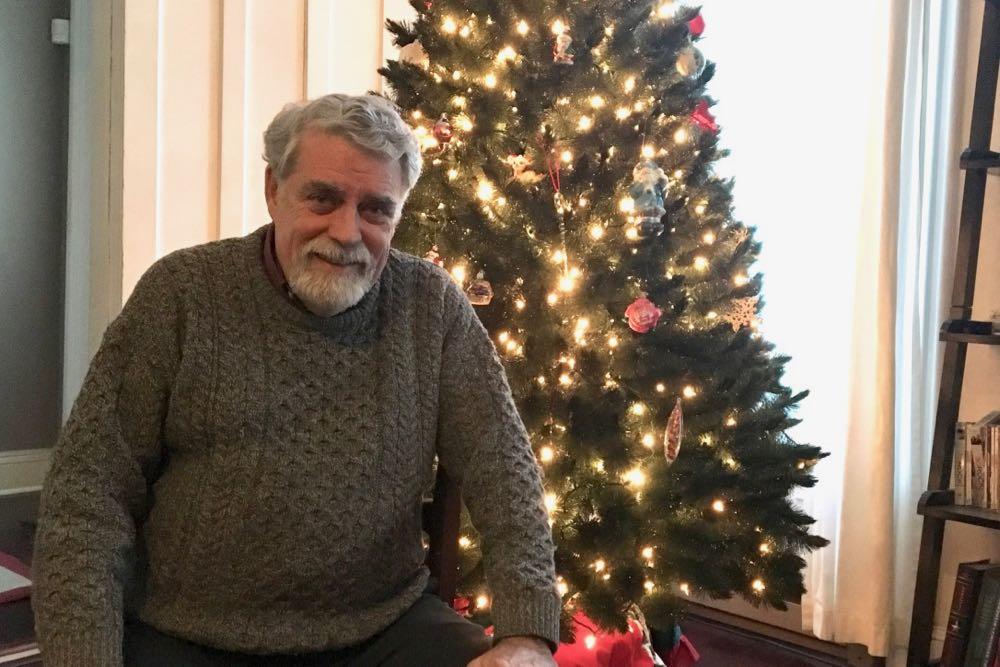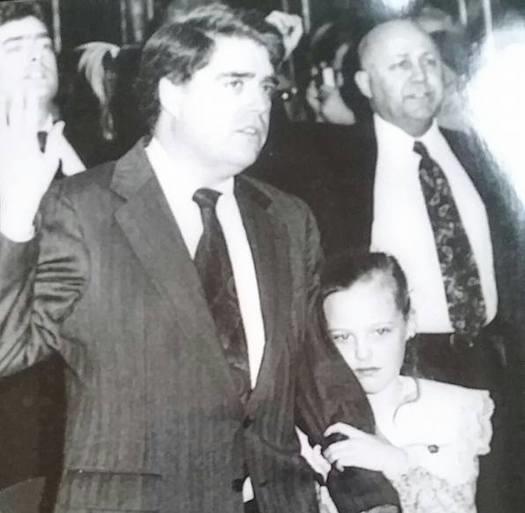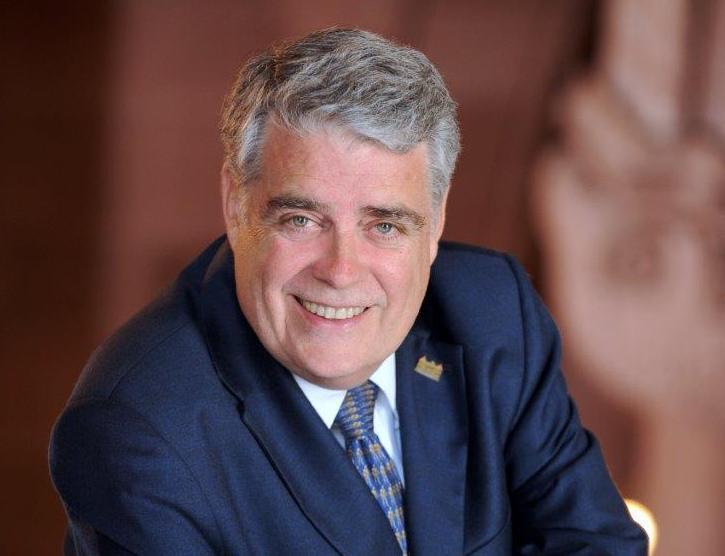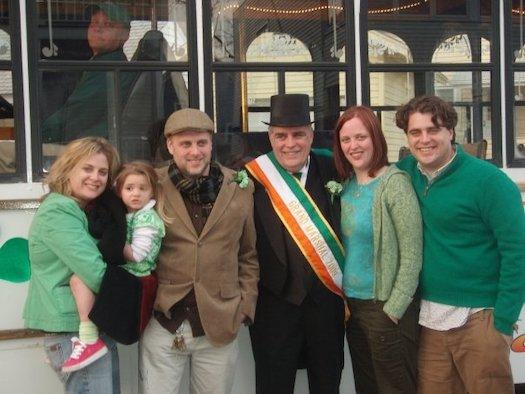Tea with Jack McEneny

Last week we were fortunate enough to spend a few minutes with Jack McEneny -- former state Assemblyman, unofficial Albany historian, and genuinely nice guy.
Jack visited the AOA downtown office for tea and a quick conversation. If AOA were continuing, we'd make this a regular feature, just because it's fun to spend time with Jack McEneny.
On this visit, he shared stories about getting into politics, his favorite job in his 48 years of public service, and what he thinks makes Albany a great place.
On starting out his life in public service
I was 17 years old, listening to JFK in his inaugural address, when he came out and he talked about the Peace Corps. I wanted to go to the Peace Corps. In later years [there was] the war on poverty with JFK talking about 30 million Americans going to bed hungry at night. The debate against Nixon. It was a very formative time.
I wanted to make a difference very early on. You see things that bother you. You see incompetence, injustice. You see opportunities that aren't being met.
I also have, personally, a difference. I have dyslexia and I didn't really learn it until I was an adult, when my kids came up we looked at [my son] John's diagnosis and I kept smiling, saying. "Oh, I know what that is. I know what that is."
And so I think I was always able to look at things a little differently. There are a lot of things I should do and I'm no good at all -- but I've always been able to look at things differently.
On his favorite job
I ran the CETA programs -- Comprehensive Employment and Training Act programs -- for Mayor Corning for both the city and the county. Nobody had done it since the WPA -- where people were hired just to be hired, and they could work for government or they could work for not-for-profits. In 1977 I had 3,200 employees.
That whole job was made up because nobody had done that type of thing. We had 200 agencies. And not one of them had a contract. It was all on a handshake. The CETA program started with just a few dozen people, then it was a few hundred, then it was well over a thousand or fifteen hundred adults as well as fifteen hundred kids in the summer and so on and so forth -- training programs and all.
I liked that job better than any other job I ever had. Really. So many people were helped. It was extraordinary. We gave a lot of people hope. We let them build their jobs and their resumes that had fallen apart, and put them back together again.

And I had a program called the Vietnam Era Veterans Internship -- totally made up. The problem was you had the G.I. bill, and the G.I. Bill took forever for the money to come in and pay out. But a landlady who's living somewhere in upper Clinton Avenue, she needs the rent because she has to pay the mortgage. And how do you stall people like that? So there had to be a way to get cash into the pockets of these Vietnam veterans.
So you had people who were going for their GED. and then you had other people who were going for a PhD. And there were hundreds of these over the course of years. If someone said they wanted to be a bookkeeper or an accountant I'd make a phone call to the city comptroller and say, "Could you use a guy, just got out of the service? He really wants to know about government finance." So they were doing exactly what they hoped to do when they graduated. So it was practical.
Father Peter Young came up to me and he's [working with] all the people on methadone. He says, "You know I've been watching this veteran's thing. Would you ever consider doing it for drug addicts." I said well, I haven't done it for drug addicts. He offered to help. He asked if they had to be veterans, and I said no. I told him we were just going to see if it works. Every one of them was a heroin addict and it turned out that every one was a Vietnam veteran. Then you realized how many of the drug addicts in the early 70s were Vietnam veterans. And you know, it just was shocking.

We had a program for the blind. We had one for people living in just unbelievable loneliness. We had a couple of old timers who would go door to door. They would identify these people who lived in such isolation. They would call them every day. It was a reassurance that you're part of the community. It was all federally funded through the CETA program. It doubled under President Carter, but it dried up in the Reagan administration.
On what is so great about Albany
I just love it. It's like your family. What's so great about your family? I suppose people on the outside could say, "This is better, or I can do better than that." But family isn't like that. And it's full of stories.
If you take the time to talk to people just about everybody has a story. And the more you get to know people, the more you know about your home community, the more fascinating it is. If you have a real superficial view of a place it really doesn't matter where you are, but the closer you get, the deeper you get into it, the more you realize it's something very special.
We brought in consultants once, when we were adding Albany to the [state's] Urban Cultural Parks [program]. So these two women came in from out of the area and were examining what was going on. We were going to describe it with a play on capital -- meaning banks as well as politics. That was going to be our theme. And I said "What do you think?" One of the women says, "Well... I really, really don't like that."
So I asked if she didn't have to choose from the options we had, what she would consider the best theme to define Albany. "That would be easy," she said. "It would be crossroads and community."
What does that mean? Well, not all cities are the same, she pointed out.
"You don't just have a hospital, you have a place over here with a medical school where they're doing open heart surgery" -- back when almost nobody was doing it. "And that's extraordinary. And you don't just have a port on the river. Lots of places have that, but your river gets a trace amount of salt in it because it's an estuary. It's not a river until you get up to the Troy dam -- and so you don't just have a river you have a window to the world. And when you go down to the Port of Albany take a look at the flags. You have people from Turkey and from Russia and from China and from South America. You're a window in the world."
And then she started to talk about politics. "There area a lot of important areas with city and county governments and even state capitals, but you have something else, because whoever gets to be the governor of New York and moves in to Eagle Street, whether that person likes it or not, that person -- male or female, and someday it will be female -- is immediately thought of as potentially the next president of the United States. There's a lot of government centers and they don't all have that."
And so this sense of neighborhood, this sense of crossroads and community makes it a very unique place.

Some people talk about Smallbany and people kind of smile and they say, "Well, what's that like?"
Well, you can go to a cocktail party and you can have two PhDs and you can be the head of a department and somebody says, "What's your name? Did did you go to St. Theresa's parish? And what eighth grade did you graduate from? What was your mother's maiden name?" Right? And so this Smallbany -- it's always bringing you down to this level of real comfort.
And then at the same time you will have somebody who comes from another state. They have new traditions. They go and challenge the system and they start questioning all the time -- and that's the crossroads.
There's always different people -- the crossroads and the community -- and sometimes they don't exactly see it the same way. And sometimes they surprise you, the crossroads. They actually like it better and they tell you why they like it. And you think, "Yeah, I never thought of that." Because you're too close. You can't see the plus. You might also turn your back on the on the bad and that's where you need people saying, "You've got to change this. This has to be better. This group is not participating fairly."
So there's constant tension between crossroads and community that really keeps the place fascinating.
On what delights him
What delights me? People doing well on their own -- having their own success. I mean, I like to open doors for them but I'd like them to be the ones to walk through. You know, I've been in politics now for ages and I've never recommended a person for a job. I've recommended them for an interview and then it's up to them. And then they have a sense that they've done something -- not that you did something. And I think self-help is the only kind of help that's real. And it builds people's pride. And that's great with me. I mean it's wonderful.
On regrets
Well, I would have liked to have been mayor. That didn't work out. But I think it worked out well in the long run.
You know, I don't have a lot of things that I'm regretting. Very little that I regret. I fell in love and married the right person in Barbara, and I had 37 years. And I didn't date anybody for three years and then I met Jan -- when you're not looking is when you find people, you know. Peter Lopez invited me to his swearing in, and I knew Jan because we would go to the Kelly's house for music and I'd park my car there and we'd walk.
So I thought, "I'll ask Jan." So we stopped on the way back at the Tory Tavern and I thought, "Oh, my God, this is a date. I haven't had a date since 1968."
Someone asked John once what he though of his dad getting married again and he said, "I think my mother sent her."
And it's worked out very well. I think I'm very lucky.
Hi there. Comments have been closed for this item. Still have something to say? Contact us.
Comments
Great interview!
(This is one reason I'll miss AOA.).
... said Bob on Dec 28, 2018 at 4:03 PM | link
Jack and I have known each other for more than 40 years. We used to testify on opposite sides at the annual Common Council budget hearings of the early seventies.He defending the proposed spending package as Albany’s Commissioner of Human Resources and I demanding more transparency on behalf of the Council of Albany Neighborhood Associations. We were also neighbors. One year, when snow cancelled the budget hearing, Jack brought a six pack of something amber around the corner to my house and we regaled our spouses and families delivering our testimony to each other.
Years later, when Jack decided to run for county legislator, we were no longer neighbors but we were still friends and I did what I could to support him in that effort because I believed in his sincerity, his integrity,and his ability. Probably my biggest claim to fame is finding the “lost” vote which cost him the primary and forced him into a write-in campaign, He won the write-in and a new era in Albany politics was launched.
Our children hung out together and were frequently mistakenly Identified as belonging to the wrong family, which brought them no end of amusement (accompanied by minimal competitive hostility).
The children are now all grown up. Some have moved away and we don’t see each other as much as we used to. But I still look forward to Sacandaga on Labor Day. And when Jack and I get together, we still engage in spirited discussions about the best way to run the world. Well, at least New York and it’s capital.
... said Cynthia Galivan on Dec 30, 2018 at 10:33 PM | link
Great article.
Didn't know he was married twice.
Love both Mary & Gregg & will sadly miss reading this!
... said mg on Dec 30, 2018 at 10:50 PM | link
I first met Jack in 1973 at a city budget hearing. I was there to badmouth what was happening. I had recently published a critical book about the O'Connell Machine. So Jack, being part of the Corning administration, wasn't exactly delighted to meet me. Skip ahead 45 years and he shows up at a talk I was giving, with a copy of my book, and asks me to autograph it! In the intervening decades, we'd run across each other many times, sharing a deep interest in history. All politicians claim they're in it for public service, but Jack was one of the rare cases where it was actually true.
... said Frank Robinson on Jan 2, 2019 at 8:03 PM | link